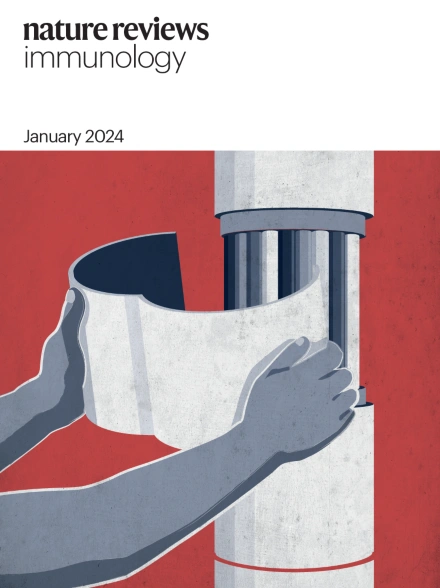定义免疫重置:实现自身免疫性疾病的持续缓解
IF 60.9
1区 医学
Q1 IMMUNOLOGY
引用次数: 0
摘要
治疗自身免疫性疾病的个性化细胞疗法--如自体造血干细胞移植和表达嵌合抗原受体的T细胞--有可能使某些自身免疫性疾病患者的病情得到持续缓解。有效清除致病性淋巴细胞并随后使其重新充满天真细胞被称为 "免疫重置"。在本视角中,我们将追溯免疫复位概念的起源及其临床、细胞和分子定义,并回顾目前为确定自身免疫性疾病长期临床缓解的生物标志物所做的尝试。来自临床试验的新数据支持了这样一个概念,即与抗CD20抗体利妥昔单抗相比,能够更深入、更广泛地消耗B细胞的疗法可以实现更高的长期缓解概率。更好地了解免疫复位的细胞和分子基础以及与这种状态相关的生物标志物,应能加快实现恢复非自身免疫状态和持续缓解的目标,同时减少对慢性免疫抑制的需求。本文章由计算机程序翻译,如有差异,请以英文原文为准。


Defining immune reset: achieving sustained remission in autoimmune diseases
Personalized cell therapies for autoimmune diseases — such as autologous haematopoietic stem cell transplantation and chimeric antigen receptor-expressing T cells — have the potential to achieve sustained remission in patients with certain autoimmune diseases. The effective elimination of pathogenic lymphocytes and their subsequent repopulation with naive cells has been termed ‘immune reset’. In this Perspective, we trace the origins of the immune reset concept and its clinical, cellular and molecular definitions, and we review current attempts to identify biomarkers for long-term clinical remission in autoimmune diseases. Emerging data from clinical trials support the concept that higher probabilities of long-term remission can be achieved with therapies that can more deeply and broadly deplete B cells than the anti-CD20 antibody rituximab. A better understanding of the cellular and molecular basis for immune reset and the biomarkers associated with this state should accelerate progress towards the goal of restoring a non-autoimmune state and sustaining remission, while reducing the need for chronic immunosuppression. New immunotherapies have the potential to mediate a sustained remission from certain autoimmune diseases. This has been referred to as achieving an ‘immune reset’ in patients. Here, Junt and colleagues discuss how we can most accurately define the term immune reset and explain the challenges in identifying suitable biomarkers of long-term disease remission.
求助全文
通过发布文献求助,成功后即可免费获取论文全文。
去求助
来源期刊

Nature Reviews Immunology
医学-免疫学
CiteScore
93.40
自引率
0.40%
发文量
131
审稿时长
6-12 weeks
期刊介绍:
Nature Reviews Immunology is a journal that provides comprehensive coverage of all areas of immunology, including fundamental mechanisms and applied aspects. It has two international standard serial numbers (ISSN): 1474-1733 for print and 1474-1741 for online. In addition to review articles, the journal also features recent developments and new primary papers in the field, as well as reflections on influential people, papers, and events in the development of immunology. The subjects covered by Nature Reviews Immunology include allergy and asthma, autoimmunity, antigen processing and presentation, apoptosis and cell death, chemokines and chemokine receptors, cytokines and cytokine receptors, development and function of cells of the immune system, haematopoiesis, infection and immunity, immunotherapy, innate immunity, mucosal immunology and the microbiota, regulation of the immune response, signalling in the immune system, transplantation, tumour immunology and immunotherapy, and vaccine development.
 求助内容:
求助内容: 应助结果提醒方式:
应助结果提醒方式:


